Paper Menu >>
Journal Menu >>
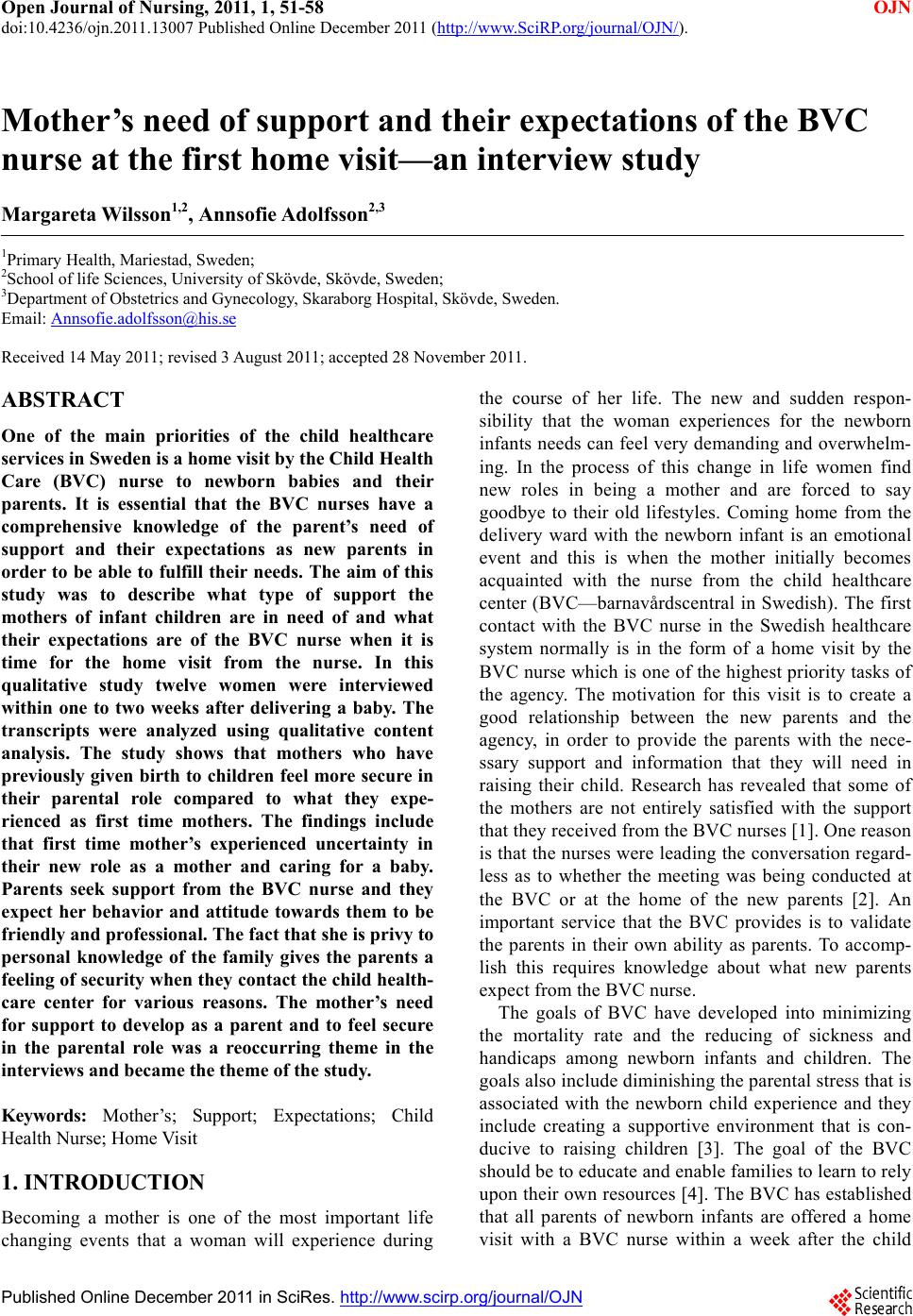 Open Journal of Nursing, 2011, 1, 51-58 OJN doi:10.4236/ojn.2011.13007 Published Online December 2011 (http://www.SciRP.org/journal/OJN/). Published Online December 2011 in SciR es. http://www.scirp.org/journal/OJN Mother’s need of support and their expectations of the BVC nurse at the first home visit—an interview study Margareta Wilss on1,2, Annsofie Adolfsson2,3 1Primary Health, Mariestad, Sweden; 2School of life Sciences, University of Skövde, Skövde, Sweden; 3Department of Obstetrics and Gynecology, Skaraborg Hospital, Skövde, Sweden. Email: Annsofie.adolfsson@his.se Received 14 May 2011; revised 3 August 2011; accepted 28 November 2011. ABSTRACT One of the main priorities of the child healthcare services in Sweden is a home visit by the Child Health Care (BVC) nurse to newborn babies and their parents. It is essential that the BVC nurses have a comprehensive knowledge of the parent’s need of support and their expectations as new parents in order to be able to fulfill their needs. The aim of this study was to describe what type of support the mothers of infant children are in need of and what their expectations are of the BVC nurse when it is time for the home visit from the nurse. In this qualitative study twelve women were interviewed within one to two weeks after delivering a baby. The transcripts were analyzed using qualitative content analysis. The study shows that mothers who have previously given birth to children feel more secure in their parental role compared to what they expe- rienced as first time mothers. The findings include that first time mother’s experienced uncertainty in their new role as a mother and caring for a baby. Parents seek support from the BVC nurse and they expect her behavior and attitude towards them to be friendly and professional. The fact that she is privy to personal knowledge of the family gives the parents a feeling of security when they conta ct the child h ealth- care center for various reasons. The mother’s need for support to develop as a parent and to feel secure in the parental role was a reoccurring theme in the interviews and became the theme of the study. Keywords: Mother’s; Support; Expectations; Child Health Nurse; Home Visit 1. INTRODUCTION Becoming a mother is one of the most important life changing events that a woman will experience during the course of her life. The new and sudden respon- sibility that the woman experiences for the newborn infants needs can feel very demanding and overwhelm- ing. In the process of this change in life women find new roles in being a mother and are forced to say goodbye to their old lifestyles. Coming home from the delivery ward with the newborn infant is an emotional event and this is when the mother initially becomes acquainted with the nurse from the child healthcare center (BVC—barnavårdscentral in Swedish). The first contact with the BVC nurse in the Swedish healthcare system normally is in the form of a home visit by the BVC nurse which is one of the highest priority tasks of the agency. The motivation for this visit is to create a good relationship between the new parents and the agency, in order to provide the parents with the nece- ssary support and information that they will need in raising their child. Research has revealed that some of the mothers are not entirely satisfied with the support that they received from the BVC nurses [1]. One reason is that the nurses were leading the conversation regard- less as to whether the meeting was being conducted at the BVC or at the home of the new parents [2]. An important service that the BVC provides is to validate the parents in their own ability as parents. To accomp- lish this requires knowledge about what new parents expect from the BVC nurse. The goals of BVC have developed into minimizing the mortality rate and the reducing of sickness and handicaps among newborn infants and children. The goals also include diminishing the parental stress that is associated with the newborn child experience and they include creating a supportive environment that is con- ducive to raising children [3]. The goal of the BVC should be to educate and enable families to learn to rely upon their own resources [4]. The BVC has established that all parents of newborn infants are offered a home visit with a BVC nurse within a week after the child 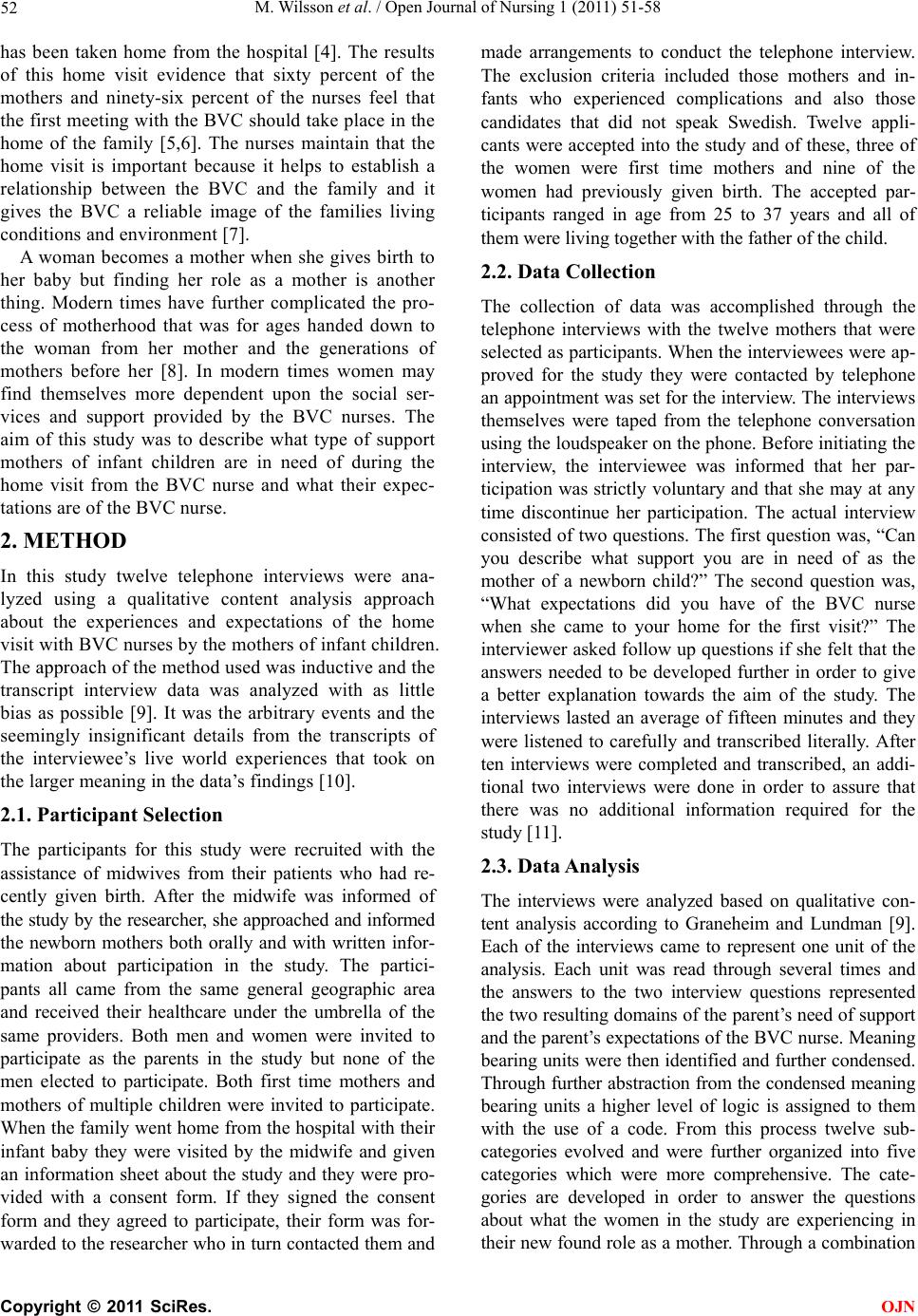 M. W ilsson et al. / Open Journal of Nursing 1 (2011) 51-58 Copyright © 2011 SciRes. OJN 52 has been taken home from the hospital [4]. The results of this home visit evidence that sixty percent of the mothers and ninety-six percent of the nurses feel that the first meeting with the BVC should take place in the home of the family [5,6]. The nurses maintain that the home visit is important because it helps to establish a relationship between the BVC and the family and it gives the BVC a reliable image of the families living conditions and environment [7]. A woman becomes a mother when she gives birth to her baby but finding her role as a mother is another thing. Modern times have further complicated the pro- cess of motherhood that was for ages handed down to the woman from her mother and the generations of mothers before her [8]. In modern times women may find themselves more dependent upon the social ser- vices and support provided by the BVC nurses. The aim of this study was to describe what type of support mothers of infant children are in need of during the home visit from the BVC nurse and what their expec- tations are of the BVC nurse. 2. METHOD In this study twelve telephone interviews were ana- lyzed using a qualitative content analysis approach about the experiences and expectations of the home visit with BVC nur ses by the moth ers of infan t chi ldren . The approach of the method used was inductive and the transcript interview data was analyzed with as little bias as possible [9]. It was the arbitrary events and the seemingly insignificant details from the transcripts of the interviewee’s live world experiences that took on the larger meaning in the data’s findings [10]. 2.1. Participant Selection The participants for this study were recruited with the assistance of midwives from their patients who had re- cently given birth. After the midwife was informed of the study by the researcher, she approached and informed the newborn mothers both orally and with written infor- mation about participation in the study. The partici- pants all came from the same general geographic area and received their healthcare under the umbrella of the same providers. Both men and women were invited to participate as the parents in the study but none of the men elected to participate. Both first time mothers and mothers of multiple children were invited to participate. When the family went home from the hospital with their infant baby they were visited by the midwife and given an information sheet about the study and they were pro- vided with a consent form. If they signed the consent form and they agreed to participate, their form was for- warded to the resear cher who in turn contacted them and made arrangements to conduct the telephone interview. The exclusion criteria included those mothers and in- fants who experienced complications and also those candidates that did not speak Swedish. Twelve appli- cants were accepted into the study and of these, three of the women were first time mothers and nine of the women had previously given birth. The accepted par- ticipants ranged in age from 25 to 37 years and all of them were living together with the father of the child. 2.2. Data Collection The collection of data was accomplished through the telephone interviews with the twelve mothers that were selected as participants. When the interviewees were ap- proved for the study they were contacted by telephone an appointment was set for the interview. The interviews themselves were taped from the telephone conversation using the loudspeak er on the p hone. Before in itiating th e interview, the interviewee was informed that her par- ticipation was strictly voluntary and that she may at any time discontinue her participation. The actual interview consisted of two questions. The first question was, “Can you describe what support you are in need of as the mother of a newborn child?” The second question was, “What expectations did you have of the BVC nurse when she came to your home for the first visit?” The interviewer asked follow up question s if she felt that the answers needed to be developed further in order to give a better explanation towards the aim of the study. The interviews lasted an average of fifteen minutes and they were listened to carefully and transcribed literally. After ten interviews were completed and transcribed, an addi- tional two interviews were done in order to assure that there was no additional information required for the study [11]. 2.3. Data Analysis The interviews were analyzed based on qualitative con- tent analysis according to Graneheim and Lundman [9]. Each of the interviews came to represent one unit of the analysis. Each unit was read through several times and the answers to the two interview questions represented the two resulting domains of the parent’s need of support and the parent’s expectations of the BVC nurse. Meaning bearing units were then identified and further condensed. Through further abstraction from the condensed meaning bearing units a higher level of logic is assigned to them with the use of a code. From this process twelve sub- categories evolved and were further organized into five categories which were more comprehensive. The cate- gories are developed in order to answer the questions about what the women in the study are experiencing in their new found role as a mother. Through a combination 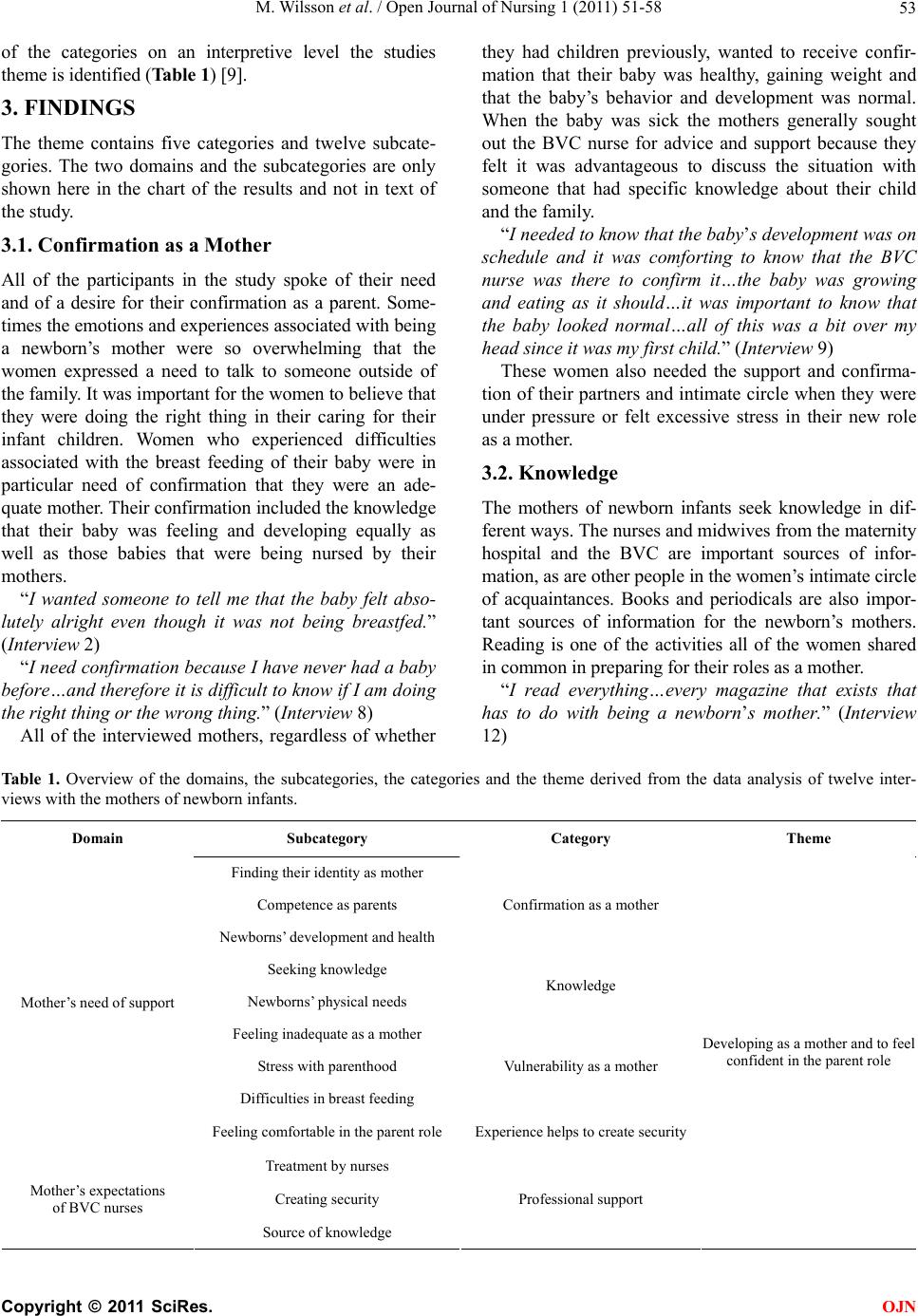 M. W ilsson et al. / Open Journal of Nursing 1 (2011) 51-58 Copyright © 2011 SciRes. OJN 53 of the categories on an interpretive level the studies theme is identified (Table 1) [9]. 3. FINDINGS The theme contains five categories and twelve subcate- gories. The two domains and the subcategories are only shown here in the chart of the results and not in text of the study. 3.1. Confirmation as a Mother All of the participants in the study spoke of their need and of a desire for their confirmation as a parent. Some- times the emotions and experiences associated with being a newborn’s mother were so overwhelming that the women expressed a need to talk to someone outside of the family. It was i mportant for th e women to believ e th at they were doing the right thing in their caring for their infant children. Women who experienced difficulties associated with the breast feeding of their baby were in particular need of confirmation that they were an ade- quate mother. Their confirmation included the knowledge that their baby was feeling and developing equally as well as those babies that were being nursed by their mothers. “I wanted someone to tell me that the baby felt abso- lutely alright even though it was not being breastfed.” (Interview 2) “I need confirmation because I have never had a baby before…and therefore it is difficult to know if I am doing the right thing or the wrong thing.” (Interview 8) All of the interviewed mothers, regardless of whether they had children previously, wanted to receive confir- mation that their baby was healthy, gaining weight and that the baby’s behavior and development was normal. When the baby was sick the mothers generally sought out the BVC nurse for advice and support because they felt it was advantageous to discuss the situation with someone that had specific knowledge about their child and the family. “I needed to know that the baby’s development was on schedule and it was comforting to know that the BVC nurse was there to confirm it…the baby was growing and eating as it should…it was important to know that the baby looked normal…all of this was a bit over my head since it was my first child.” (Interview 9) These women also needed the support and confirma- tion of their partners and in timate circle when they were under pressure or felt excessive stress in their new role as a mother. 3.2. Knowledge The mothers of newborn infants seek knowledge in dif- ferent ways. The nurses and midwives from the maternity hospital and the BVC are important sources of infor- mation, as are other people in the women’s intimate circle of acquaintances. Books and periodicals are also impor- tant sources of information for the newborn’s mothers. Reading is one of the activities all of the women shared in common in prepari n g f or their roles as a mother. “I read everything…every magazine that exists that has to do with being a newborn’s mother.” (Interview 12) Table 1. Overview of the domains, the subcategories, the categories and the theme derived from the data analysis of twelve inter- views with the mothers of newborn infants. Domain Subcategory Category Theme Finding their identity as mother Competence as parents Newborns’ development and health Confirmation as a mother Seeking knowledge Newborns’ physical needs Knowledge Feeling inadequate as a moth er Stress with parenthood Difficulties in breast f eeding Vulnerability as a mother Mother’s need of support Feeling comfortable in the parent role Experience helps to create security Treatment by nurses Creating security Mother’s e x pectations of BVC nurses Source of knowledge Professional support Developing as a mother and to feel confident in the paren t role 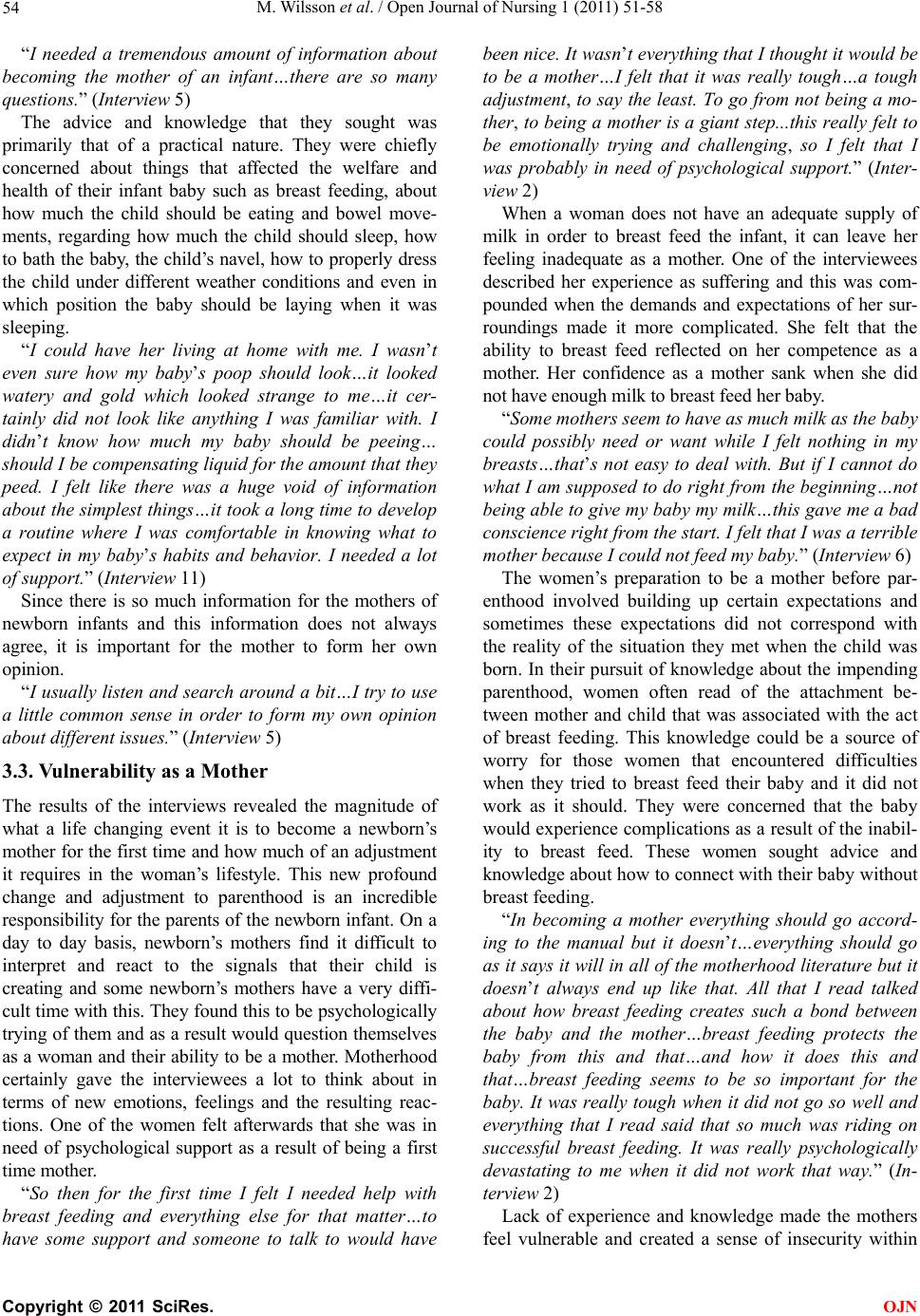 M. W ilsson et al. / Open Journal of Nursing 1 (2011) 51-58 Copyright © 2011 SciRes. OJN 54 “I needed a tremendous amount of information about becoming the mother of an infant…there are so many questions.” (Interview 5) The advice and knowledge that they sought was primarily that of a practical nature. They were chiefly concerned about things that affected the welfare and health of their infant baby such as breast feeding, about how much the child should be eating and bowel move- ments, regarding how much the child should sleep, how to bath the baby, the child’s navel, how to properly dress the child under different weather conditions and even in which position the baby should be laying when it was sleeping. “I could have her living at home with me. I wasn’t even sure how my baby’s poop should look…it looked watery and gold which looked strange to me…it cer- tainly did not look like anything I was familiar with. I didn’t know how much my baby should be peeing… should I be compensating liquid for the amount that they peed. I felt like there was a huge void of information about the simplest things…it took a long time to develop a routine where I was comfortable in knowing what to expect in my baby’s habits and behavior. I needed a lot of support.” (Interview 11) Since there is so much information for the mothers of newborn infants and this information does not always agree, it is important for the mother to form her own opinion. “I usually listen and search around a bit…I try to use a little common sense in order to form my own opinion about different issues.” (Interview 5) 3.3. Vulnerability as a Mother The results of the interviews revealed the magnitude of what a life changing event it is to become a newborn’s mother for the first time an d how much of an adjustment it requires in the woman’s lifestyle. This new profound change and adjustment to parenthood is an incredible responsibility fo r the parents of the newborn infant. On a day to day basis, newborn’s mothers find it difficult to interpret and react to the signals that their child is creating and some newborn’s mothers have a very diffi- cult time with this. They found this to be psychologically trying of them and as a result would questio n themselves as a woman and their ability to be a mother. Motherhood certainly gave the interviewees a lot to think about in terms of new emotions, feelings and the resulting reac- tions. One of the women felt afterwards that she was in need of psychological support as a result of being a first time mother. “So then for the first time I felt I needed help with breast feeding and everything else for that matter…to have some support and someone to talk to would have been nice. It wasn’t everything that I thought it would be to be a mother…I felt that it was really tough…a tough adjustment, to say the least. To go from not being a mo- ther, to being a mother is a giant step...this really felt to be emotionally trying and challenging, so I felt that I was probably in need of psychological support.” (Inter- view 2) When a woman does not have an adequate supply of milk in order to breast feed the infant, it can leave her feeling inadequate as a mother. One of the interviewees described her experience as suffering and this was com- pounded when the demands and expectations of her sur- roundings made it more complicated. She felt that the ability to breast feed reflected on her competence as a mother. Her confidence as a mother sank when she did not have enough m i lk t o breast feed her baby. “Some mothers seem to have as much milk as the baby could possibly need or want while I felt nothing in my breasts…that’s not easy to deal with. But if I cannot do what I am supposed to do right from the beginning…no t being able to give my baby my milk…this gave me a bad conscience right from the start. I felt that I was a terrible mother becaus e I coul d n ot feed my ba by. ” (Interview 6) The women’s preparation to be a mother before par- enthood involved building up certain expectations and sometimes these expectations did not correspond with the reality of the situation they met when the child was born. In their pursuit of knowledge about the impending parenthood, women often read of the attachment be- tween mother and child that was associated with the act of breast feeding. This knowledge could be a source of worry for those women that encountered difficulties when they tried to breast feed their baby and it did not work as it should. They were concerned that the baby would experience complications as a result of the inabil- ity to breast feed. These women sought advice and knowledge about h ow to conn ect wi th the ir b ab y w itho ut breast feeding. “In becoming a mother everything should go accord- ing to the manual but it doesn’t…everything should go as it says it will in a ll of the motherhood literatu re but it doesn’t always end up like that. All that I read talked about how breast feeding creates such a bond between the baby and the mother…breast feeding protects the baby from this and that…and how it does this and that…breast feeding seems to be so important for the baby. It was really tough when it did not go so well and everything that I read said that so much was riding on successful breast feeding. It was really psychologically devastating to me when it did not work that way.” (In- terview 2) Lack of experience and knowledge made the mothers feel vulnerable and created a sense of insecurity within 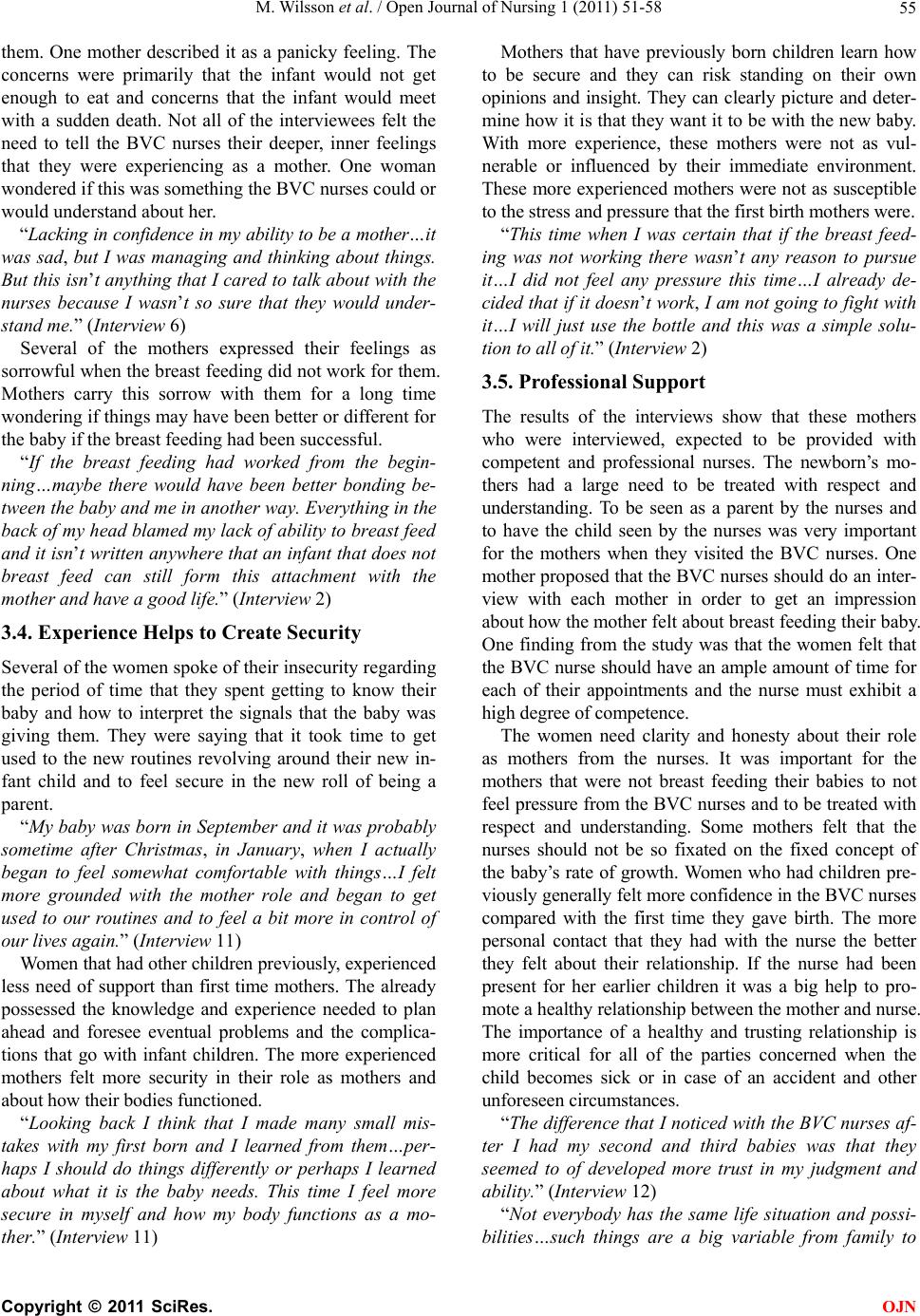 M. W ilsson et al. / Open Journal of Nursing 1 (2011) 51-58 Copyright © 2011 SciRes. OJN 55 them. One mother described it as a panicky feeling. The concerns were primarily that the infant would not get enough to eat and concerns that the infant would meet with a sudden death. Not all of the interviewees felt the need to tell the BVC nurses their deeper, inner feelings that they were experiencing as a mother. One woman wondered if this was something the BVC nurses co u ld or would understand about her. “Lacking in confid ence in my a bility to be a mother…i t was sad, but I was managing and thinking about things. But this isn’t anything that I cared to talk about with the nurses because I wasn’t so sure that they would under- stand me.” (Interview 6) Several of the mothers expressed their feelings as sorrowful when the breast feeding did not work for them. Mothers carry this sorrow with them for a long time wondering if thing s may have b een better or different for the baby if the breast feeding had been successful. “If the breast feeding had worked from the begin- ning…maybe there would have been better bonding be- tween the baby and me in another way. Everything in the back of my h ead blamed my la ck of ability to b reast feed and it isn’t written anywhere that an infant that does not breast feed can still form this attachment with the mother and have a good life.” (Interview 2) 3.4. Experience Helps to Create Security Several of the women spoke of their insecurity regarding the period of time that they spent getting to know their baby and how to interpret the signals that the baby was giving them. They were saying that it took time to get used to the new routines revolving around their new in- fant child and to feel secure in the new roll of being a parent. “My baby was born in September and it was probably sometime after Christmas, in January, when I actually began to feel somewhat comfortable with things…I felt more grounded with the mother role and began to get used to our routines and to feel a bit more in control of our lives again.” (Interview 11) Women that had other children previously, experienced less need of support than first time mothers. The already possessed the knowledge and experience needed to plan ahead and foresee eventual problems and the complica- tions that go with infant children. The more experienced mothers felt more security in their role as mothers and about how their b odi es fu nct i oned . “Looking back I think that I made many small mis- takes with my first born and I learned from them…per- haps I should do things differently or perhaps I learned about what it is the baby needs. This time I feel more secure in myself and how my body functions as a mo- ther.” (Interview 11) Mothers that have previously born children learn how to be secure and they can risk standing on their own opinions and insight. They can clearly picture and deter- mine how it is that they want it to be with the new baby. With more experience, these mothers were not as vul- nerable or influenced by their immediate environment. These more experienced mothers were not as susceptible to the stress and pressure that the first birth mothers were. “This time when I was certain that if the breast feed- ing was not working there wasn’t any reason to pursue it…I did not feel any pressure this time…I already de- cided that if it doesn’t work, I am not go ing to fight with it…I will just use the bottle and this was a simple solu- tion to all of it.” (Interview 2) 3.5. Professional Support The results of the interviews show that these mothers who were interviewed, expected to be provided with competent and professional nurses. The newborn’s mo- thers had a large need to be treated with respect and understanding. To be seen as a parent by the nurses and to have the child seen by the nurses was very important for the mothers when they visited the BVC nurses. One mother proposed th at the BVC nurses shou ld do an inter- view with each mother in order to get an impression about how the mother felt abou t br east f eed ing th eir b ab y. One f inding f rom the study was that the women felt that the BVC nurse should have an ample amount of time for each of their appointments and the nurse must exhibit a high degree of competence. The women need clarity and honesty about their role as mothers from the nurses. It was important for the mothers that were not breast feeding their babies to not feel pressure from the BVC nurses and to be treated with respect and understanding. Some mothers felt that the nurses should not be so fixated on the fixed concept of the baby’s rate of growth. Women who had children pre- viously generally felt more confid ence in th e BVC nurses compared with the first time they gave birth. The more personal contact that they had with the nurse the better they felt about their relationship. If the nurse had been present for her earlier children it was a big help to pro- mote a healthy relatio nship between the mother and nurse. The importance of a healthy and trusting relationship is more critical for all of the parties concerned when the child becomes sick or in case of an accident and other unforeseen circumstances. “The difference that I noticed with th e BVC nurses af- ter I had my second and third babies was that they seemed to of developed more trust in my judgment and ability.” (Interview 12) “Not everybody has the same life situation and possi- bilities…such things are a big variable from family to 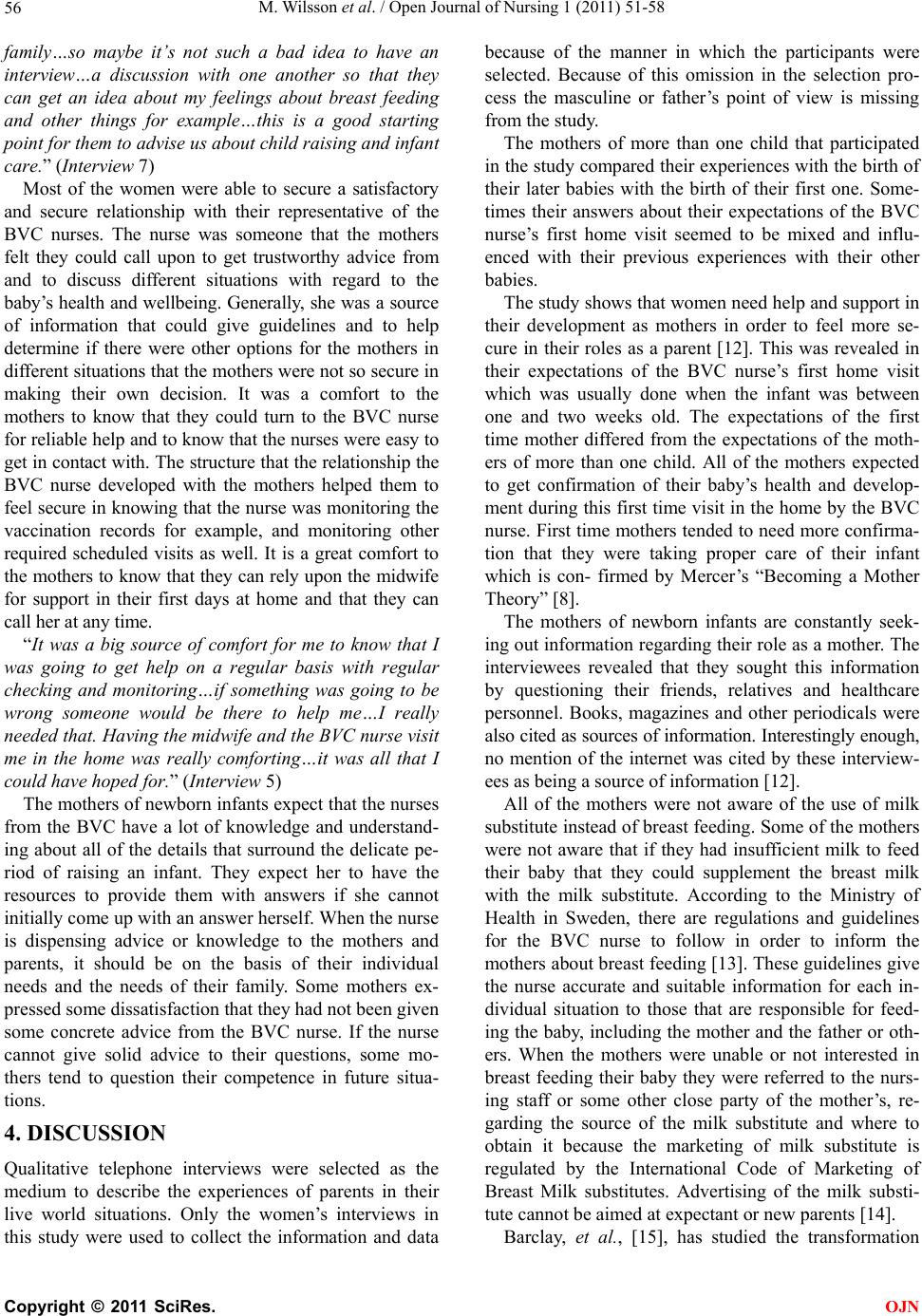 M. W ilsson et al. / Open Journal of Nursing 1 (2011) 51-58 Copyright © 2011 SciRes. OJN 56 family…so maybe it’s not such a bad idea to have an interview…a discussion with one another so that they can get an idea about my feelings about breast feeding and other things for example…this is a good starting point for them to advise us about child raising and infant care.” (Interview 7) Most of the women were able to secure a satisfactory and secure relationship with their representative of the BVC nurses. The nurse was someone that the mothers felt they could call upon to get trustworthy advice from and to discuss different situations with regard to the baby’s health and wellbeing. Generally, she was a source of information that could give guidelines and to help determine if there were other options for the mothers in different situations that the mothers were not so secure in making their own decision. It was a comfort to the mothers to know that they could turn to the BVC nurse for reliable help and to know that the nurses were easy to get in contact with. The stru cture that the relationship the BVC nurse developed with the mothers helped them to feel secure in knowing that the nurse was monitoring the vaccination records for example, and monitoring other required scheduled visits as well. It is a great comfort to the mothers to know that they can rely upon the midwife for support in their first days at home and that they can call her at any time. “It was a big source of comfort for me to know that I was going to get help on a regular basis with regular checking and monitoring…if something was going to be wrong someone would be there to help me…I really needed that. Having the midwife and the BVC nurse visit me in the home was really comforting…it was all that I could have hoped for.” (Interview 5) The mothers of newborn infants expect that the nurses from the BVC have a lot of knowledge and understand- ing about all of the details that surround the delicate pe- riod of raising an infant. They expect her to have the resources to provide them with answers if she cannot initially come up with an an sw er h erself. When the nurse is dispensing advice or knowledge to the mothers and parents, it should be on the basis of their individual needs and the needs of their family. Some mothers ex- pressed some dissatisfaction that they had not been given some concrete advice from the BVC nurse. If the nurse cannot give solid advice to their questions, some mo- thers tend to question their competence in future situa- tions. 4. DISCUSSION Qualitative telephone interviews were selected as the medium to describe the experiences of parents in their live world situations. Only the women’s interviews in this study were used to collect the information and data because of the manner in which the participants were selected. Because of this omission in the selection pro- cess the masculine or father’s point of view is missing from the study. The mothers of more than one child that participated in the study compared th eir experiences with the birth of their later babies with the birth of their first one. Some- times their answers about their expectations of the BVC nurse’s first home visit seemed to be mixed and influ- enced with their previous experiences with their other babies. The study shows that women need h elp and support in their development as mothers in order to feel more se- cure in their roles as a parent [12]. This was revealed in their expectations of the BVC nurse’s first home visit which was usually done when the infant was between one and two weeks old. The expectations of the first time mother differed from the expectations of the moth- ers of more than one child. All of the mothers expected to get confirmation of their baby’s health and develop- ment during this first time visit in the ho me by the BVC nurse. First time mothers tended to need more confirma- tion that they were taking proper care of their infant which is con- firmed by Mercer’s “Becoming a Mother Theory” [8]. The mothers of newborn infants are constantly seek- ing out information regarding their role as a mother. The interviewees revealed that they sought this information by questioning their friends, relatives and healthcare personnel. Books, magazines and other periodicals were also cited as sources of information. Interestingly enough, no mention of the internet was cited by these interview- ees as being a source of information [12]. All of the mothers were not aware of the use of milk substitute instead o f breast feeding. Some o f the mothers were not aware that if they had insufficient milk to feed their baby that they could supplement the breast milk with the milk substitute. According to the Ministry of Health in Sweden, there are regulations and guidelines for the BVC nurse to follow in order to inform the mothers about breast feeding [13]. These guidelines give the nurse accurate and suitable information for each in- dividual situation to those that are responsible for feed- ing the baby, including the mother and the father or oth- ers. When the mothers were unable or not interested in breast feeding their baby they were referred to the nurs- ing staff or some other close party of the mother’s, re- garding the source of the milk substitute and where to obtain it because the marketing of milk substitute is regulated by the International Code of Marketing of Breast Milk substitutes. Advertising of the milk substi- tute cannot be aimed at expectant or new parents [14]. Barclay, et al., [15], has studied the transformation 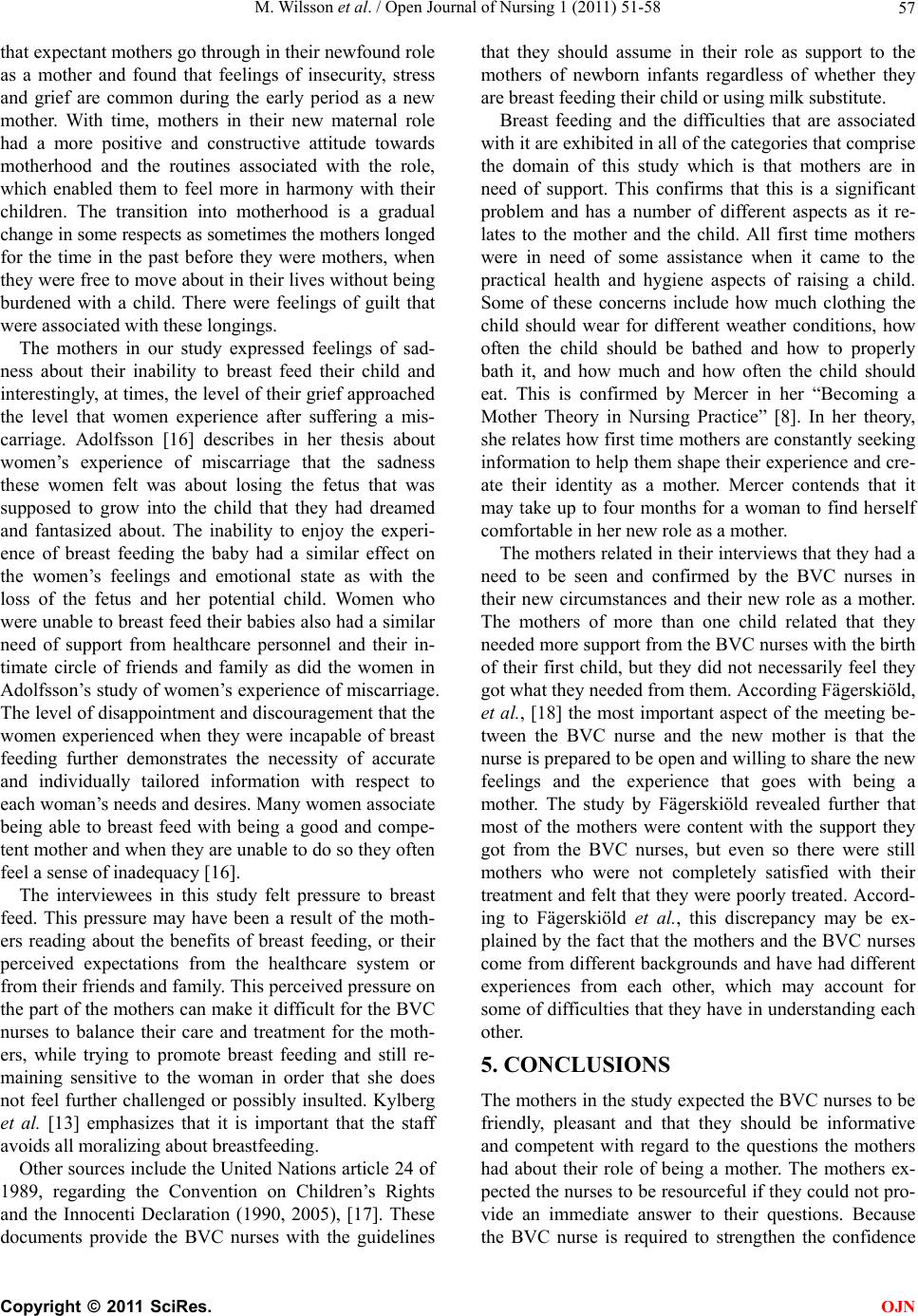 M. W ilsson et al. / Open Journal of Nursing 1 (2011) 51-58 Copyright © 2011 SciRes. OJN 57 that expectant mothers go through in their newfound role as a mother and found that feelings of insecurity, stress and grief are common during the early period as a new mother. With time, mothers in their new maternal role had a more positive and constructive attitude towards motherhood and the routines associated with the role, which enabled them to feel more in harmony with their children. The transition into motherhood is a gradual change in some respects as sometimes the mothers longed for the time in the past before they were mothers, when they were free to move about in their lives without being burdened with a child. There were feelings of guilt that were associated with these longings. The mothers in our study expressed feelings of sad- ness about their inability to breast feed their child and interestingly, at times, the level of their grief approached the level that women experience after suffering a mis- carriage. Adolfsson [16] describes in her thesis about women’s experience of miscarriage that the sadness these women felt was about losing the fetus that was supposed to grow into the child that they had dreamed and fantasized about. The inability to enjoy the experi- ence of breast feeding the baby had a similar effect on the women’s feelings and emotional state as with the loss of the fetus and her potential child. Women who were unable to breast feed their babies also had a similar need of support from healthcare personnel and their in- timate circle of friends and family as did the women in Adolfsson’s study of women’s experience of miscarriage. The level of disappointment and discouragement that the women experienced when they were incapable of breast feeding further demonstrates the necessity of accurate and individually tailored information with respect to each woman’s needs and desires. Many women associate being able to breast feed with being a good and compe- tent mother and when th ey are unable to do so they often feel a sense of inadequacy [16]. The interviewees in this study felt pressure to breast feed. This pressure may have been a result of the moth- ers reading about the benefits of breast feeding, or their perceived expectations from the healthcare system or from their friends and family. This perceived pressure on the part of the mothers can make it difficult for the BVC nurses to balance their care and treatment for the moth- ers, while trying to promote breast feeding and still re- maining sensitive to the woman in order that she does not feel further challenged or possibly insulted. Kylberg et al. [13] emphasizes that it is important that the staff avoids all moralizing about breastfeeding. Other sources include the United Nations article 24 of 1989, regarding the Convention on Children’s Rights and the Innocenti Declaration (1990, 2005), [17]. These documents provide the BVC nurses with the guidelines that they should assume in their role as support to the mothers of newborn infants regardless of whether they are breast feeding their child or using milk substitute. Breast feeding and the difficulties that are associated with it are exhibited in all of the categories that comprise the domain of this study which is that mothers are in need of support. This confirms that this is a significant problem and has a number of different aspects as it re- lates to the mother and the child. All first time mothers were in need of some assistance when it came to the practical health and hygiene aspects of raising a child. Some of these concerns include how much clothing the child should wear for different weather conditions, how often the child should be bathed and how to properly bath it, and how much and how often the child should eat. This is confirmed by Mercer in her “Becoming a Mother Theory in Nursing Practice” [8]. In her theory, she relates how first time mothers are constantly seeking information to help them shape their experience and cre- ate their identity as a mother. Mercer contends that it may take up to four months for a woman to find herself comfortable in her new role as a mother. The mothers related in their interviews th at they had a need to be seen and confirmed by the BVC nurses in their new circumstances and their new role as a mother. The mothers of more than one child related that they needed more support from the BVC nurses with the birth of their first child, but they did not necessarily feel they got what they needed from them. According Fägerskiöld, et al., [18] the most important aspect of the meeting be- tween the BVC nurse and the new mother is that the nurse is prepared to be op en an d willing to share the n ew feelings and the experience that goes with being a mother. The study by Fägerskiöld revealed further that most of the mothers were content with the support they got from the BVC nurses, but even so there were still mothers who were not completely satisfied with their treatment and felt that they were poorly treated. Accord- ing to Fägerskiöld et al., this discrepancy may be ex- plained by the fact that the mothers and the BVC nurses come from different backgrounds and have had different experiences from each other, which may account for some of difficulties that they have in und erstanding each other. 5. CONCLUSIONS The mothers in the study expected the BVC nurses to be friendly, pleasant and that they should be informative and competent with regard to the questions the mothers had about their role of being a mother. The mothers ex- pected the nurses to be resourceful if they could not pro- vide an immediate answer to their questions. Because the BVC nurse is required to strengthen the confidence 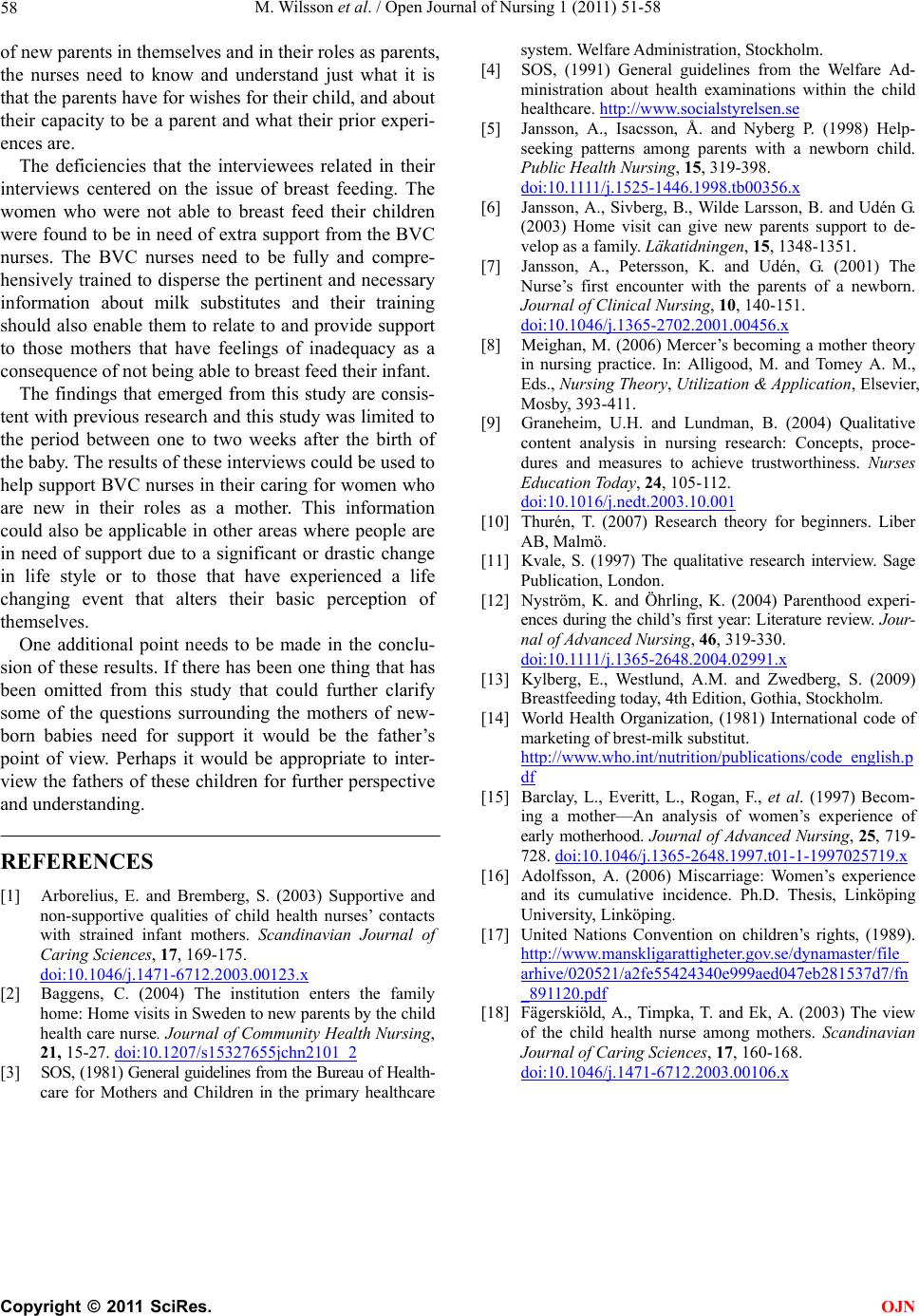 M. W ilsson et al. / Open Journal of Nursing 1 (2011) 51-58 Copyright © 2011 SciRes. OJN 58 of new parents in themselves and in their roles as parents, the nurses need to know and understand just what it is that the parents hav e for wishes for their child, and abou t their capacity to be a parent and what their prior experi- ences are. The deficiencies that the interviewees related in their interviews centered on the issue of breast feeding. The women who were not able to breast feed their children were found to be in need of extra support from the BVC nurses. The BVC nurses need to be fully and compre- hensively trained to disperse the pertin ent and necessary information about milk substitutes and their training should also enable them to relate to and provide support to those mothers that have feelings of inadequacy as a consequence o f not b ei n g a ble to breast feed their infant. The findings that emerged from this study are consis- tent with previous research and th is study was limited to the period between one to two weeks after the birth of the baby. The results of these interviews could be used to help support BVC nurs es in their caring for women who are new in their roles as a mother. This information could also be applicable in other areas where people are in need of support due to a significant or drastic change in life style or to those that have experienced a life changing event that alters their basic perception of themselves. One additional point needs to be made in the conclu- sion of these results. If there has been one thing that has been omitted from this study that could further clarify some of the questions surrounding the mothers of new- born babies need for support it would be the father’s point of view. Perhaps it would be appropriate to inter- view the fathers of these children for further perspective and understanding. REFERENCES [1] Arborelius, E. and Bremberg, S. (2003) Supportive and non-supportive qualities of child health nurses’ contacts with strained infant mothers. Scandinavian Journal of Caring Sciences, 17, 169-175. doi:10.1046/j.1471-6712.2003.00123.x [2] Baggens, C. (2004) The institution enters the family home: Home visits in Sweden to new parents by the child health care nurse. Journal of Community Health Nursing, 21, 15-27. doi:10.1207/s15327655jchn2101_2 [3] SOS, (1981) General guidelines from the Bureau of Health- care for Mothers and Children in the primary healthcare system. Welfare Administration, Stockholm. [4] SOS, (1991) General guidelines from the Welfare Ad- ministration about health examinations within the child healthcare. http://www.socialstyrelsen.se [5] Jansson, A., Isacsson, Å. and Nyberg P. (1998) Help- seeking patterns among parents with a newborn child. Public Health Nursing, 15, 319-398. d oi: 10.1111 /j. 1525 - 1446.1998.tb00356.x [6] Jansson, A., Sivberg, B., Wilde Larsson, B. and Udén G. (2003) Home visit can give new parents support to de- velop as a family. Läkatidningen, 15, 1348-1351. [7] Jansson, A., Petersson, K. and Udén, G. (2001) The Nurse’s first encounter with the parents of a newborn. Journal of Clinical Nursing, 10, 140-151. doi:10.1046/j.1365-2702.2001.00456.x [8] Meighan, M. (2006) Mercer ’s becoming a mother theory in nursing practice. In: Alligood, M. and Tomey A. M., Eds., Nursing Theory, Utilization & Application, Elsevier, Mosby, 393-411. [9] Graneheim, U.H. and Lundman, B. (2004) Qualitative content analysis in nursing research: Concepts, proce- dures and measures to achieve trustworthiness. Nurses Education To day, 24, 105-112. doi:10.1016/j.nedt.2003.10.001 [10] Thurén, T. (2007) Research theory for beginners. Liber AB, Malmö. [11] Kvale, S. (1997) The qualitative research interview. Sage Publication, London. [12] Nyström, K. and Öhrling, K. (2004) Parenthood experi- ences during the child’s first year: Literature review. Jour- nal of Advanced Nursing, 46, 319-330. d oi: 10.1111 /j. 1365 - 2648.2004.02991.x [13] Kylberg, E., Westlund, A.M. and Zwedberg, S. (2009) Breastfeeding today, 4th Edition, Gothia, Stockholm. [14] World Health Organization, (1981) International code of marketing of brest-milk substitut. http://www.who.int/nutrition/publications/code_english.p df [15] Barclay, L., Everitt, L., Rogan, F., et al. (1997) Becom- ing a mother—An analysis of women’s experience of early motherhood. Journal of Advanced Nursing, 25, 719- 728. doi:10.1046/j.1365-2648.1997.t01-1-1997025719.x [16] Adolfsson, A. (2006) Miscarriage: Women’s experience and its cumulative incidence. Ph.D. Thesis, Linköping University, Linköping. [17] United Nations Convention on children’s rights, (1989). http://www.manskligarattigheter.gov.se/dynamaster/file_ arhive/020521/a2fe55424340e999aed047eb281537d7/fn _891120.pdf [18] Fägerskiöld, A., Timpka, T. and Ek, A. (2003) The view of the child health nurse among mothers. Scandinavian Journal of Caring Sciences, 17, 160-168. doi:10.1046/j.1471-6712.2003.00106.x |

